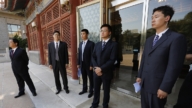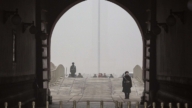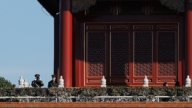【新唐人2013年11月12日讯】11月9号,中共三中全会开幕。在此之前的一天,中共党报《人民日报》再次抛出有关“两个三十年互不否定”的说法。大陆学者指出,中共前领导人邓小平的改革开放政策,事实上就是“对毛泽东的大跃进和文革的否定”,但是中共为了维护自己的统治合法性而掩耳盗铃。而《人民日报》的说法,预示着三中全会不会带来根本的变化。
《人民日报》这篇文章是基于中共总书记习近平一月份的讲话。1月5号习近平在高层会议上宣称:“不能用改革开放后的历史时期否定改革开放前的历史时期,也不能用改革开放前的历史时期否定改革开放后的历史时期。”。
北京外国语大学新闻学副教授乔木对《新唐人》表示,中共执政的前后三十年肯定是互相否定的。在此之前中共也对“文革”进行了彻底否定。
乔木:“前30年肯定是否定后30年的,前30年所谓的人民公社、大跃进、文革这一套,肯定是否定后30年的改革开放市场经济这一套的。回到后30年来说,对前30年也是一个否定。最起码从中共有一个十三届六中全会,已经对文革是彻底否定了的。即使是对毛,事实上也是否定的。”
乔木分析,习近平这么讲,有他的政治上的考虑。他是为了强调共产党的领导权威,强调意识形态,强调社会主义制度。
乔木:“随着市场经济国际化的发展,对这种正统的意识形态实际都是否定的,或者至少没有多大吸引力,从他来说,不否定前30年,其实就是想重新找回所谓的制度或理论自信,也就是维护党的领导的一致性,习近平讲话也提到过,确保红色江山不变色。”
大陆自由派媒体《炎黄春秋》杂志副社长杨继绳表示,所谓“不能相互否定”就是不能否定共产党的领导。
大陆《炎黄春秋》杂志副社长杨继绳:“否定后30年就是否定改革开放,否定前30年就是否定共产党的一贯领导,否定毛泽东,毛泽东跟共产党是不可分的,所以为了维护共产党的领导,当然不能否定它。”
曾任雅虎中国总经理的谢文分析,习近平发表这番言论的另外一个原因是,高层派系斗争激烈,习近平试图弥合裂痕。
谢文:“在现在左右尖锐对立,大家看法不一,矛盾重重,而国内又面临下一步要改革的呼声很高的情况下,他只好相对来说站在一个中立的立场上,因为现在社会上一部分人否定前30年,一部分人否定后30年。那么他干脆说,哇,这两个其实是有一致的地方,你们既不要否定前30年,也不要否定后30年。”
乔木指出,事关一个国家和十三亿人大政方针的会议,中共却采取完全封闭的秘密形式,令人诧异,也显示出中共不会有根本性的变化。
乔木:“一般认为还是换汤不换药。天不变,道亦不变。穿旧鞋走老路。知识份子肯定是不太满意。他们希望能在言论自由、司法独立、学术自由各方面有更大的空间。可是从整个半年以来对网络整肃、言论打压来说,目前看不到这个迹象。”
乔木表示,从民众来说,他们更关注民生,希望民生福利诸如养老、医疗、住房等方面有改善,但是现在没有看到有多少变化。至于商人,一直在选择用脚投票。从香港商人李嘉诚撤资,到中国大量移民潮,显示他们在规避风险,对未来发展不信任,不看好。
上世纪80年代,曾担任中共中央政治体制改革研讨小组研究人员的吴伟,对美国《纽约时报》表示,中共一方面举起左派的旗帜,一方面说必须有改革。他们没有显示任何解决政治问题的愿望。但是如果他们不在政治层面解决问题,大多数这些经济改革措施在完成之前,将土崩瓦解。
采访编辑/秦雪 后制/李勇
Communist Regime Dares Not Disprove Mao Zedong
Prior to November 9, the opening day of the Third Plenary,
the Chinese Communist Party (CCP) controlled newspaper,
People’s Daily, published an article on ‘no denying the first
30 years of history (before reform) with second 30 years
of history (after reform), and vice versa.’
A Chinese scholar analyses how former leader
Deng Xiaoping’s reform and opening policy has in fact
disproved Mao Zedong’s political movements,
the Great Leap Forward and the Cultural Revolution.
In order to maintain its ruling legitimacy, the CCP
has been entirely deceiving.
The People’s Daily article is just another sign
of the fact that the Third Plenum won’t bring change.
The People’s Daily article was based on the CCP General
Secretary Xi Jinping’s January speech.
On January 5, Xi Jinping talked at a high-level meeting
about ‘not disproving the history prior to the reform
and opening with history after the reform and opening,’
and vice versa.
Beijing Foreign Studies University associated professor
at the School of English and International Studies,
Qiao Moo, told the NTD TV that during the 60 years
of ruling, the CCP has in fact negated one another.
The CCP has also completely disproved
the Cultural Revolution.
Qiao Moo, Associate professor of Beijing Foreign Studies
University: “The first 30 years would definitely
have negated the second 30 years.
In those 30 years, the so-called people’s communes,
the Great Leap Forward, the Cultural Revolution,
would definitely have negated the reform and
opening up of the market economy.
The second 30 years also definitely disproved
the first 30 years.
During the 6th Plenary of the 13th CPC Central Committee,
the Cultural Revolution was already disproved.
Even Mao was disproved."
Qiao Moo analyses a political agenda in Xi Jinping’s talk.
He wanted to stress the authority of the CCP,
the ideology, and the socialist system.
Qiao Moo: “Internationalization of the market economy
in fact denies or pays no attention to the ideology.
To him, not to deny the first 30 years is to restore the system
or regain the belief so that the leadership
of the CCP can be maintained.
Xi Jinping has previously mentioned the importance
of the country staying ‘red.'"
The Chinese liberalism magazine, Yanhuang Chunqiu,
deputy director Yang Jisheng explains that the so-called
‘no negating each other’ means no denying
the CCP leadership.
Yang Jisheng, deputy director of Yanhuang Chunqiu:
“Negating the second 30 years is to negate the reform
and opening up, and negating the first 30 years is to negate
the leadership of the CCP and Mao Zedong.
Mao and the CCP are inseparable.
They have to maintain the CCP leadership.
They can not deny either one."
Former Yahoo China general manager Xie Wen analyses
Xi Jinping’s talk as trying to bridge the rift
in the political infightings.
Xie Wen, former general manager of Yahoo China: “Facing
the conflict between the rightist and the leftist and the strong
demand of reform, he put himself in a neutral position.
Some people oppose the first 30 years,
while others deny the second 30 years of the CCP ruling.
He therefore came up with a neutral idea
of not denying either one."
Qiao Moo expresses his disbelief in the CCP’s closed door
policy during meetings.
He thinks it is significant as that it matters
to a country with a population of 1.3 billion people.
It suggests there won’t be any fundamental change
in the CCP.
Qiao Moo: “It is just old wine in a new bottle.
Nothing will change.
It is like wearing the same shoes and taking the same road.
The intellectuals are generally unhappy about it.
They want freedom of speech, an independent judiciary,
and more academic freedom.
According to the suppression of the Internet and the media
this year, there is no sign of change."
Qiao Moo believes that people care more about the livelihood
and welfares, such as pension, health care, and housing,
but nothing has happened yet.
As for the businessmen, they vote with their feet.
For example, Hong Kong businessman Li Ka-shing
cut his ownership stake in China, and
the massive emigration from China has shown people’s
concern and distrust of the risk and future in China.
Wu Wei, a former aide to central party leaders who were
involved in planning China’s market overhauls in the 1980s
told the New York Times, “In one hand, they’re holding up
the leftist banner.
On the other hand, they say there must be reform,”
Mr. Wu said.
“They don’t show any desire to take on political issues,
but if you don’t take on issues at the political level, most
of these economic reform measures will fall apart before
they’re completed,” reported the New York Times.
Interview Edit / Qin Xue Post-produciton /



























